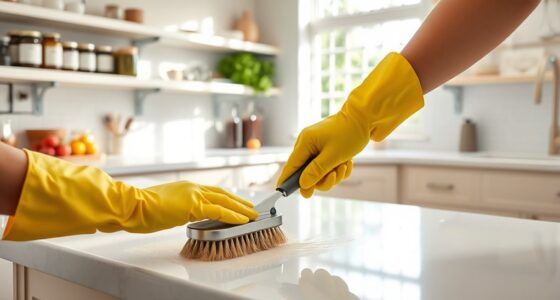House cleaning usually takes around 4 to 6 hours a week, but this can vary based on your home’s size, clutter, and lifestyle habits. Apartment dwellers typically spend 4 to 5 hours, while homeowners might spend closer to 6 hours. Also, certain rooms, like kitchens and bathrooms, need more attention. By establishing a regular routine, you can manage your cleaning time better. Keep going to discover more tips on efficient cleaning and maintenance!
Key Takeaways
- Average cleaning time ranges from 4 to 6 hours weekly for most individuals, depending on home type and size.
- Cleaning a living room takes about 10-20 minutes, while bedrooms require 30 minutes to 1 hour.
- Kitchens and bathrooms typically need 30-60 minutes each for thorough cleaning.
- Deep cleaning can last between 3 to 15 hours, depending on the home’s size and clutter level.
- Regular maintenance routines help manage cleaning time effectively and prevent larger issues from developing.
Average Weekly Cleaning Time
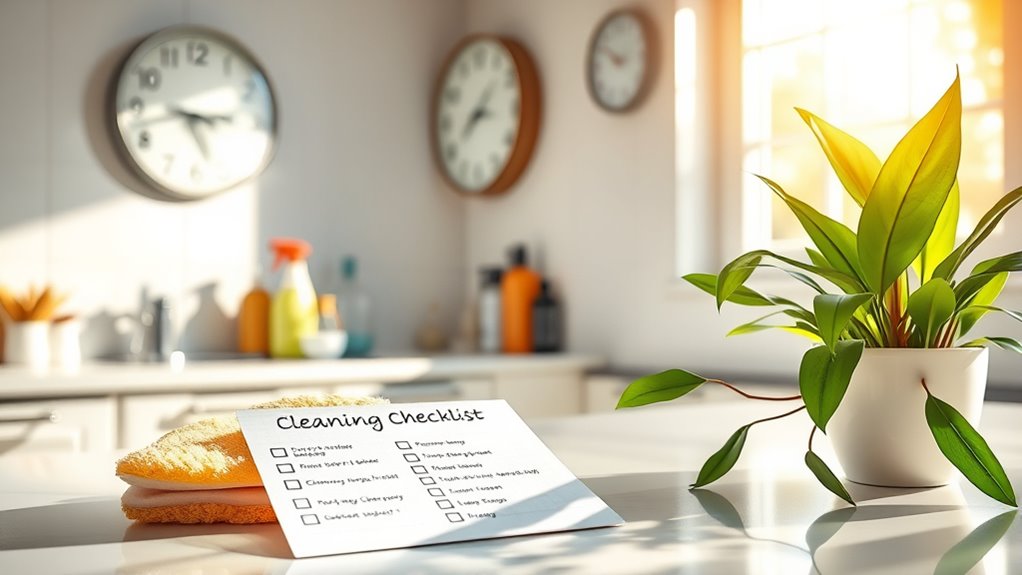
When it comes to keeping your home clean, you’ll likely find that the average person spends about 4 to 6 hours each week on cleaning tasks. If you live in an apartment, you might spend around 4 to 5 hours weekly, while homeowners often dedicate closer to 6 hours. The size of your home plays a significant role in this time commitment; larger spaces generally require more effort to maintain. Establishing a regular cleaning routine can help you manage your time better, as it prevents dirt and dust from piling up. Additionally, the average cost for house cleaning can be a motivating factor in deciding whether to hire help or do it yourself.
Factors Influencing Cleaning Time
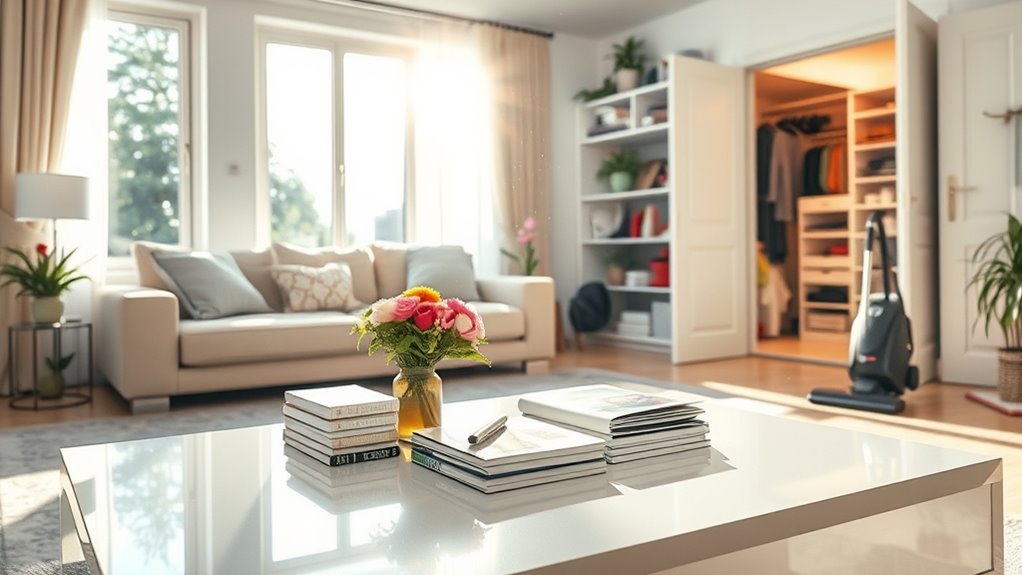
Maintaining a clean home involves more than just setting aside a few hours each week; several factors influence how long cleaning actually takes.
The size of your home plays a significant role; larger spaces require more time. Clutter can also extend your cleaning duration, as you’ll need to organize and clear surfaces. Additionally, the number of rooms and type of furniture affects how long it takes, especially if you have intricate designs or heavy pieces to maneuver. High-traffic areas like kitchens and bathrooms need more frequent attention, adding to the overall time. Furthermore, understanding average cleaning times can help you allocate your schedule more effectively.
Finally, your lifestyle habits and the presence of pets or children can create extra messes, making it essential to contemplate these factors when planning your cleaning routine.
Average Cleaning Times by Room
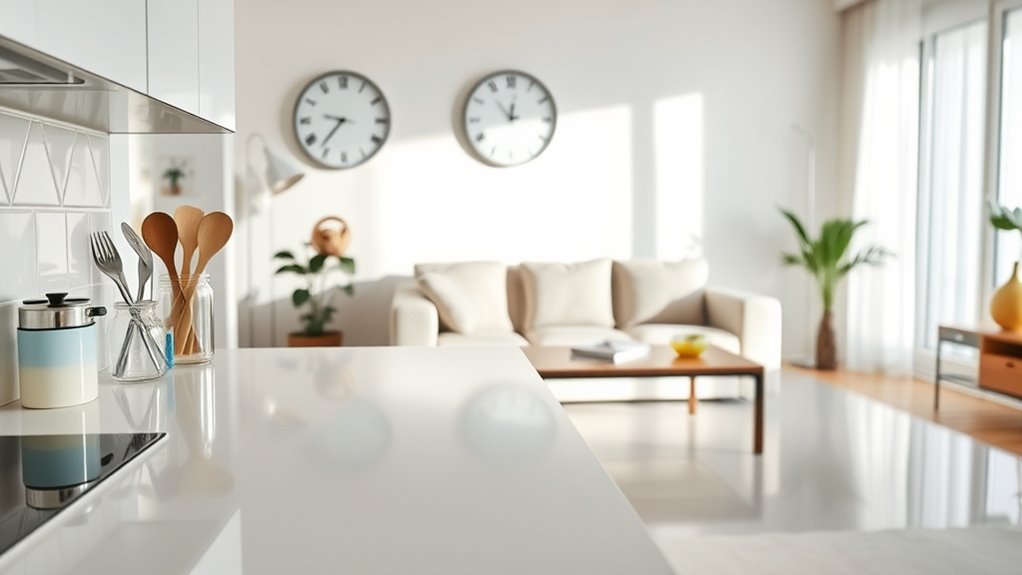
Cleaning times can vary considerably from room to room, depending on factors like size and clutter.
Cleaning times fluctuate significantly across different rooms, influenced by their size and the amount of clutter present.
In the living room, you’ll spend about 10-20 minutes dusting surfaces, vacuuming, and tidying up.
Bedrooms usually require 30 minutes to 1 hour, as you’ll need to make the bed, tidy clothes, and dust furniture.
Kitchens often take 30-60 minutes due to cleaning appliances, countertops, and floors, with the average American spending about six hours a week on cleaning tasks.
Bathrooms demand similar attention, typically needing 30-60 minutes for scrubbing fixtures, mirrors, and the shower area.
Don’t forget about dining rooms, which might take another 10-20 minutes.
Deep Cleaning and Special Tasks
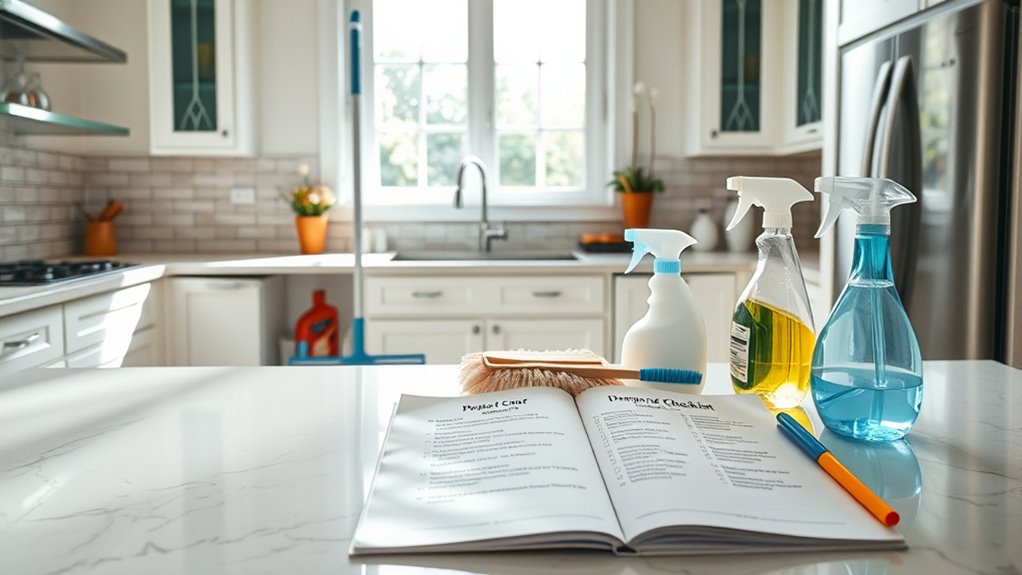
Deep cleaning goes beyond regular tidying, focusing on those hard-to-reach areas and stubborn grime that accumulate over time. Depending on your house size and condition, deep cleaning can take anywhere from 3 to 15 hours. Larger homes with more rooms and significant clutter require more time. Implementing regular grooming to control pet hair can also help in maintaining cleanliness during deep cleans. Special tasks, like cleaning appliances, windows, and gutters, can add to this duration. If your home hasn’t been cleaned thoroughly in a while, you might need extra time. Having the right cleaning supplies can speed up the process, as can hiring professionals who come equipped with specialized tools and expertise. Heavy Duty Clean is often necessary for homes with significant dirt or clutter, which may further extend the cleaning timeframe. Additionally, ensuring proper airflow around the unit can enhance the effectiveness of your air purifier during and after the cleaning process. Regular maintenance and decluttering can also help minimize the time needed for deep cleaning in the future. Furthermore, consistent filter replacement ensures that your air purifier operates efficiently, contributing to a healthier environment during cleaning efforts. Additionally, maintaining a healthy lifestyle through cleanliness supports overall well-being, making deep cleaning efforts even more worthwhile.
Cost of Professional Cleaning

When it comes to house cleaning, understanding the costs involved can help you make informed decisions. The price of professional cleaning typically depends on several factors. Square footage is essential; larger homes require more time and resources, raising the cost. The type of cleaning matters too—deep cleaning tasks like oven or fridge cleaning will cost more. Additionally, specialized equipment can add to your total. Intensity of the clean is also a significant factor, as homes in poor condition will incur higher fees for deep cleaning.
Regular cleaning services often come with discounted rates, while location plays a role, as urban areas generally have higher costs. Expect to see hourly rates ranging from $40 to $100 per cleaner. Obtaining estimates and exploring service packages can help you manage costs and find the best value for your needs.
Efficiency and Time Management Tips

To maximize your house cleaning efficiency, it’s essential to adopt effective time management strategies. Start by creating a cleaning plan for each room, ensuring you declutter and organize items to save time. Establishing a routine will help you decrease your cleaning time significantly. Gathering your supplies in a caddy for easy access, and prioritizing tasks based on need, promotes mindful decluttering and enhances overall organization. Additionally, having a well-planned functional layout can streamline your cleaning process. Set realistic goals to keep yourself motivated.
When cleaning, work top to bottom and left to right, using multi-purpose tools and microfiber cloths for versatility. Assign daily, weekly, and monthly tasks to maintain a consistent routine and reduce clutter. Stay flexible to adapt your schedule as needed, and focus on one task at a time for maximum efficiency. Regular maintenance will help you skip deep cleaning sessions and save time overall.
Importance of Regular Maintenance
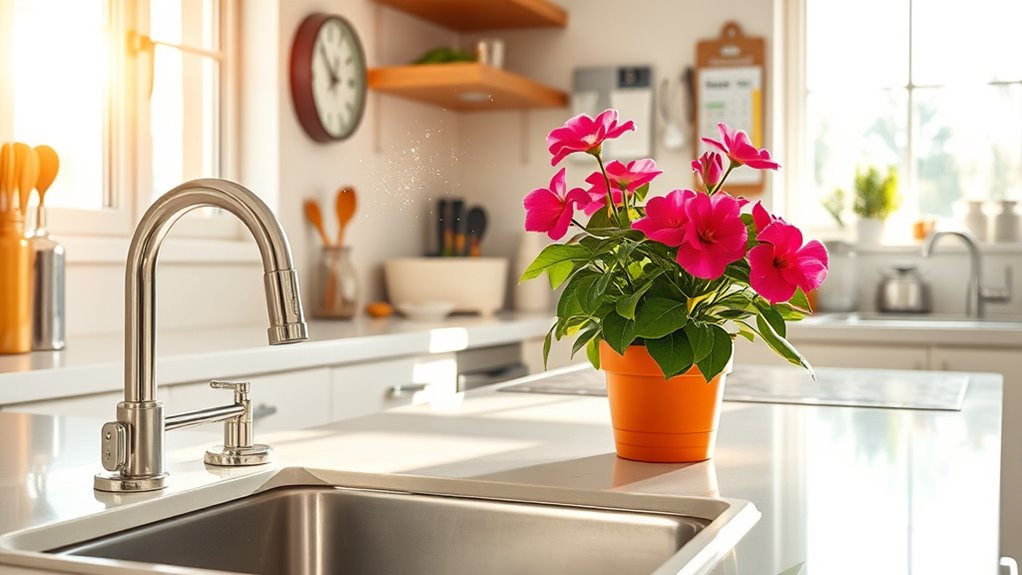
Regular maintenance isn’t just a chore; it’s an essential investment in your home’s longevity and value.
By keeping up with regular checks, you can prevent costly repairs, like a roof replacement that can set you back nearly $6,800. Smaller, planned maintenance tasks are more manageable and cost-effective than facing major replacements. Additionally, engaging in preventive maintenance strategies helps you stay ahead of potential issues before they escalate. Proper tools and techniques can enhance the efficiency of your maintenance tasks, making them quicker and easier to accomplish. Furthermore, maintaining your HVAC systems, including modern heat pumps, can significantly improve your home’s energy efficiency. This is particularly true for systems that achieve efficiency ratings of 300% to 600%, maximizing your savings on energy bills.
Plus, well-maintained systems, like your HVAC, run more efficiently, lowering your utility bills. This upkeep not only enhances your home’s curb appeal, potentially increasing its market value by up to 10%, but it also guarantees safety by preventing hazards. Routine checks can also help you identify small issues before they escalate into larger, more expensive problems.
Ultimately, maintaining your home improves your quality of life, providing comfort and reducing stress related to unexpected repairs. Regular maintenance truly pays off!
Frequently Asked Questions
How Do Pets Affect House Cleaning Time?
Pets greatly increase your house cleaning time. With shedding fur, dander, and occasional accidents, you find yourself sweeping and vacuuming more often.
Daily cleaning tasks become essential, and you may need specialized pet-safe products to tackle stains and odors.
To manage this, establish a consistent cleaning schedule and consider regular grooming for your pets.
If it feels overwhelming, hiring professional help can alleviate some of the burden, keeping your home clean and healthy.
What Cleaning Supplies Speed up the Process?
To speed up your cleaning process, gather essential supplies like multi-surface cleaners, microfiber cloths, and a good vacuum with a HEPA filter.
Use dusters with extendable handles to reach high spots easily. Organize your cleaning caddy so everything’s within arm’s reach, minimizing time spent searching for supplies.
Focusing on specific tasks for each room and employing specialized tools can also enhance your efficiency, making cleaning quicker and less strenuous.
Can I Clean My House in Less Than an Hour?
Sure, you can clean your house in less than an hour, especially if you tackle tasks with tenacious technique!
Start by swiftly sorting surfaces and swiftly sweeping floors. Focus on essential areas like the kitchen and bathroom, where dirt often dwells.
Gather your gear beforehand to maximize efficiency, and don’t let clutter accumulate.
With a little organization and determination, you’ll have a tidy home in no time, leaving you free for fun!
How Often Should I Deep Clean My Home?
You should deep clean your home based on your lifestyle and needs.
If you have pets or a busy household, aim for a monthly deep clean to manage dirt and allergens.
For less active homes, quarterly might suffice.
Seasonal deep cleaning can help prepare your space for changing conditions, while an annual thorough cleaning is essential.
Pay attention to signs like dust buildup or odors that indicate it’s time for a deeper clean.
What Are the Benefits of Hiring a Professional Cleaner?
Hiring a professional cleaner offers you numerous benefits.
You save time, allowing you to focus on what matters most, whether it’s work, family, or hobbies.
Professionals clean more efficiently, improving your home’s hygiene by removing allergens and pathogens. This creates a healthier environment, reducing stress and enhancing your mental well-being.
Plus, regular cleaning protects your assets, prolonging the life of your furnishings.
Ultimately, you enjoy a cleaner, more comfortable living space without the hassle.
Conclusion
In summary, understanding how long house cleaning should take can transform your space from chaotic to serene in no time. By knowing the average times and factors at play, you can tackle cleaning with confidence. Remember, regular maintenance makes all the difference—it’s like having a magic wand that keeps dirt at bay! So don’t let cleaning overwhelm you; instead, embrace it as a way to create a welcoming and peaceful home. Happy cleaning!



